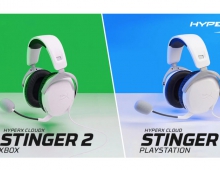
Microsoft, HP unveil new high-def video disc formats
While a compromise standard for high-definition DVDs is being negotiated in Japan between backers of the HD-DVD and rival Blu-Ray discs, two rogue high-def video disc formats may have a chance to sneak in the back door.
Both proposals came to light at the recent Home Entertainment Show in New York.
A Microsoft executive, Ed Bland, let on that his company's forthcoming second-generation game console - expected to be called Xbox 360 - will deliver high-definition content using a conventional red laser pickup and the DVD-ROM discs found in current game consoles, computer drives and video disc players.
By contrast, both HD-DVD and Blu-Ray formats require finer-focusing blue lasers, as well as new breeds of higher-capacity discs.
Hewlett Packard also was at the Home Entertainment Show, showcasing high-resolution video recording on its latest generation of Media Center PCs, designed for living room use (and so re-labeled "Digital Entertainment Centers").
While recordings are limited to the content nabbed from a built-in broadcast HD tuner, users will be able to store these shows in true high-def quality on a hard-disk drive and (more curiously) in "high bit rate" form on the centers' optional DVD recorder.
Just one hour of higher resolution content can be captured by the HP system on a dual layer DVD- or DVD+ recordable disc. But the discs will then be readable by any current DVD disc player and will "look better than the best commercial discs, especially if you have a new DVD player that upconverts the output to a 720p signal," said an HP demonstrator. The three-model line goes on sale next week for $1,500 to $2,600.
To deliver high-definition images from games and videos, Xbox 360 will deploy a Microsoft-developed data-encoding scheme (or codec) called VC-1.
Extending on Windows Media 9 software (with robust copy protection that will supposedly thwart online sharing), VC-1 signal compression is very efficient. A two-hour film can be encoded in high def on a standard, dual-layer DVD, though there's then no room left over for those extras that movie disc buyers seem to love.
VC-1 is actually one of three mandatory codecs approved for use in both HD-DVD and Blu-Ray systems. And recently, Microsoft and Warner Bros. announced that they would jointly issue some movie discs at year's end in the VC-1 format, labeling them HD-DVDs, the high-def format Warner is pushing. But will these discs also be readable on red-laser-equipped Xbox 360s, due out in the same time frame, and also on current Windows XP computers loaded with Windows Media 9 software?
Probably yes, on at least the first count. But Warner Bros. and Microsoft are reserving further comment until the big video game show, E3, in Los Angeles the week of May 16 - or at least until the Xbox 360 sneak preview that will be popping on MTV May 12 at 9:30 p.m.
Meanwhile, Sony has long been saying that its next-generation PlayStation 3 game system will support the much higher capacity Blu-Ray format for high-def games and video playback. If the two rival HD video disc camps do make their peace and resolve to deliver a unified format (as happened on the eve of the DVD's debut), Sony may have to re-engineer its game system a little.
That could give Xbox 360 as much as a year's lead in the marketplace, relative to both PS3 and stand-alone, high-definition video disc players and recorders. But it's unlikely that other movie studios will pile on, in the interim, with many titles supporting the Microsoft alternative for watching HD movies. Another no-frills solution, D-VHS tape, has been around for several years without winning many supporters.
Source: NY Times
A Microsoft executive, Ed Bland, let on that his company's forthcoming second-generation game console - expected to be called Xbox 360 - will deliver high-definition content using a conventional red laser pickup and the DVD-ROM discs found in current game consoles, computer drives and video disc players.
By contrast, both HD-DVD and Blu-Ray formats require finer-focusing blue lasers, as well as new breeds of higher-capacity discs.
Hewlett Packard also was at the Home Entertainment Show, showcasing high-resolution video recording on its latest generation of Media Center PCs, designed for living room use (and so re-labeled "Digital Entertainment Centers").
While recordings are limited to the content nabbed from a built-in broadcast HD tuner, users will be able to store these shows in true high-def quality on a hard-disk drive and (more curiously) in "high bit rate" form on the centers' optional DVD recorder.
Just one hour of higher resolution content can be captured by the HP system on a dual layer DVD- or DVD+ recordable disc. But the discs will then be readable by any current DVD disc player and will "look better than the best commercial discs, especially if you have a new DVD player that upconverts the output to a 720p signal," said an HP demonstrator. The three-model line goes on sale next week for $1,500 to $2,600.
To deliver high-definition images from games and videos, Xbox 360 will deploy a Microsoft-developed data-encoding scheme (or codec) called VC-1.
Extending on Windows Media 9 software (with robust copy protection that will supposedly thwart online sharing), VC-1 signal compression is very efficient. A two-hour film can be encoded in high def on a standard, dual-layer DVD, though there's then no room left over for those extras that movie disc buyers seem to love.
VC-1 is actually one of three mandatory codecs approved for use in both HD-DVD and Blu-Ray systems. And recently, Microsoft and Warner Bros. announced that they would jointly issue some movie discs at year's end in the VC-1 format, labeling them HD-DVDs, the high-def format Warner is pushing. But will these discs also be readable on red-laser-equipped Xbox 360s, due out in the same time frame, and also on current Windows XP computers loaded with Windows Media 9 software?
Probably yes, on at least the first count. But Warner Bros. and Microsoft are reserving further comment until the big video game show, E3, in Los Angeles the week of May 16 - or at least until the Xbox 360 sneak preview that will be popping on MTV May 12 at 9:30 p.m.
Meanwhile, Sony has long been saying that its next-generation PlayStation 3 game system will support the much higher capacity Blu-Ray format for high-def games and video playback. If the two rival HD video disc camps do make their peace and resolve to deliver a unified format (as happened on the eve of the DVD's debut), Sony may have to re-engineer its game system a little.
That could give Xbox 360 as much as a year's lead in the marketplace, relative to both PS3 and stand-alone, high-definition video disc players and recorders. But it's unlikely that other movie studios will pile on, in the interim, with many titles supporting the Microsoft alternative for watching HD movies. Another no-frills solution, D-VHS tape, has been around for several years without winning many supporters.
Source: NY Times





















